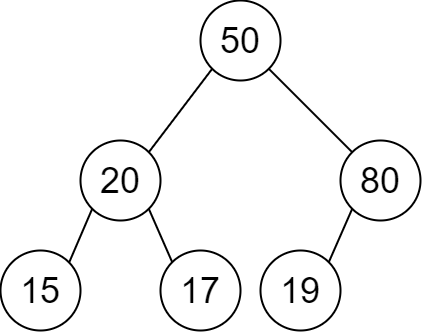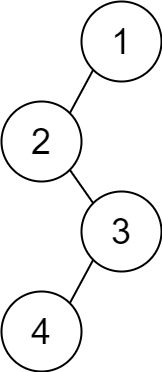Welcome to Subscribe On Youtube
Formatted question description: https://leetcode.ca/all/2196.html
2196. Create Binary Tree From Descriptions (Medium)
You are given a 2D integer array descriptions where descriptions[i] = [parenti, childi, isLefti] indicates that parenti is the parent of childi in a binary tree of unique values. Furthermore,
- If
isLefti == 1, thenchildiis the left child ofparenti. - If
isLefti == 0, thenchildiis the right child ofparenti.
Construct the binary tree described by descriptions and return its root.
The test cases will be generated such that the binary tree is valid.
Example 1:

Input: descriptions = [[20,15,1],[20,17,0],[50,20,1],[50,80,0],[80,19,1]] Output: [50,20,80,15,17,19] Explanation: The root node is the node with value 50 since it has no parent. The resulting binary tree is shown in the diagram.
Example 2:

Input: descriptions = [[1,2,1],[2,3,0],[3,4,1]] Output: [1,2,null,null,3,4] Explanation: The root node is the node with value 1 since it has no parent. The resulting binary tree is shown in the diagram.
Constraints:
1 <= descriptions.length <= 104descriptions[i].length == 31 <= parenti, childi <= 1050 <= isLefti <= 1- The binary tree described by
descriptionsis valid.
Similar Questions:
Solution 1. Hash Table
Maintain a hash map from node value to node pointer. Use this map to prevent creating the same node multiple times.
To get the root node, we can maintain another map parentMap mapping from child node pointer to parent node pointer. We pick a random node pointer and keep traversing back towards the root using parentMap until the node doesn’t have any parents.
-
// OJ: https://leetcode.com/problems/create-binary-tree-from-descriptions/ // Time: O(N) // Space: O(N) class Solution { public: TreeNode* createBinaryTree(vector<vector<int>>& A) { unordered_map<TreeNode*, TreeNode*> parentMap; // map from child node pointer to parent node pointer unordered_map<int, TreeNode*> m; // map from node value to node pointer for (auto &v : A) { int p = v[0], c = v[1], isLeft = v[2]; auto parent = m.count(p) ? m[p] : (m[p] = new TreeNode(p)); auto child = m.count(c) ? m[c] : (m[c] = new TreeNode(c)); if (isLeft) parent->left = child; else parent->right = child; parentMap[child] = parent; } auto root = m.begin()->second; // Pick a random node pointer and keep traversing up until the node doesn't have any parents while (parentMap.count(root)) root = parentMap[root]; return root; } }; -
# Definition for a binary tree node. # class TreeNode: # def __init__(self, val=0, left=None, right=None): # self.val = val # self.left = left # self.right = right class Solution: def createBinaryTree(self, descriptions: List[List[int]]) -> Optional[TreeNode]: g = defaultdict(TreeNode) vis = set() for p, c, left in descriptions: if p not in g: g[p] = TreeNode(p) if c not in g: g[c] = TreeNode(c) if left: g[p].left = g[c] else: g[p].right = g[c] vis.add(c) for v, node in g.items(): if v not in vis: return node ############ # 2196. Create Binary Tree From Descriptions # https://leetcode.com/problems/create-binary-tree-from-descriptions/ # Definition for a binary tree node. # class TreeNode: # def __init__(self, val=0, left=None, right=None): # self.val = val # self.left = left # self.right = right class Solution: def createBinaryTree(self, descriptions: List[List[int]]) -> Optional[TreeNode]: deg = collections.defaultdict(int) graph = collections.defaultdict(list) mp = {} for parent, child, isLeft in descriptions: deg[child] += 1 graph[parent].append((child, isLeft)) def go(parent): node = TreeNode(parent) for child, isLeft in graph[parent]: if isLeft == 1: node.left = go(child) else: node.right = go(child) return node for parent, _, __ in descriptions: if deg[parent] == 0: return go(parent) -
/** * Definition for a binary tree node. * public class TreeNode { * int val; * TreeNode left; * TreeNode right; * TreeNode() {} * TreeNode(int val) { this.val = val; } * TreeNode(int val, TreeNode left, TreeNode right) { * this.val = val; * this.left = left; * this.right = right; * } * } */ class Solution { public TreeNode createBinaryTree(int[][] descriptions) { Map<Integer, TreeNode> m = new HashMap<>(); Set<Integer> vis = new HashSet<>(); for (int[] d : descriptions) { int p = d[0], c = d[1], isLeft = d[2]; if (!m.containsKey(p)) { m.put(p, new TreeNode(p)); } if (!m.containsKey(c)) { m.put(c, new TreeNode(c)); } if (isLeft == 1) { m.get(p).left = m.get(c); } else { m.get(p).right = m.get(c); } vis.add(c); } for (Map.Entry<Integer, TreeNode> entry : m.entrySet()) { if (!vis.contains(entry.getKey())) { return entry.getValue(); } } return null; } } -
/** * Definition for a binary tree node. * type TreeNode struct { * Val int * Left *TreeNode * Right *TreeNode * } */ func createBinaryTree(descriptions [][]int) *TreeNode { m := make(map[int]*TreeNode) vis := make(map[int]bool) for _, d := range descriptions { p, c, left := d[0], d[1], d[2] if m[p] == nil { m[p] = &TreeNode{Val: p} } if m[c] == nil { m[c] = &TreeNode{Val: c} } if left == 1 { m[p].Left = m[c] } else { m[p].Right = m[c] } vis[c] = true } for v, node := range m { if !vis[v] { return node } } return nil } -
/** * Definition for a binary tree node. * class TreeNode { * val: number * left: TreeNode | null * right: TreeNode | null * constructor(val?: number, left?: TreeNode | null, right?: TreeNode | null) { * this.val = (val===undefined ? 0 : val) * this.left = (left===undefined ? null : left) * this.right = (right===undefined ? null : right) * } * } */ function createBinaryTree(descriptions: number[][]): TreeNode | null { const map = new Map<number, [number, number]>(); const isRoot = new Map<number, boolean>(); for (const [parent, child, isLeft] of descriptions) { let [left, right] = map.get(parent) ?? [0, 0]; if (isLeft) { left = child; } else { right = child; } if (!isRoot.has(parent)) { isRoot.set(parent, true); } isRoot.set(child, false); map.set(parent, [left, right]); } const dfs = (val: number) => { if (val === 0) { return null; } const [left, right] = map.get(val) ?? [0, 0]; return new TreeNode(val, dfs(left), dfs(right)); }; for (const [key, val] of isRoot.entries()) { if (val) { return dfs(key); } } return null; } -
// Definition for a binary tree node. // #[derive(Debug, PartialEq, Eq)] // pub struct TreeNode { // pub val: i32, // pub left: Option<Rc<RefCell<TreeNode>>>, // pub right: Option<Rc<RefCell<TreeNode>>>, // } // // impl TreeNode { // #[inline] // pub fn new(val: i32) -> Self { // TreeNode { // val, // left: None, // right: None // } // } // } use std::rc::Rc; use std::cell::RefCell; use std::collections::HashMap; impl Solution { fn dfs(val: i32, map: &HashMap<i32, [i32; 2]>) -> Option<Rc<RefCell<TreeNode>>> { if val == 0 { return None; } let mut left = None; let mut right = None; if let Some(&[l_val, r_val]) = map.get(&val) { left = Self::dfs(l_val, map); right = Self::dfs(r_val, map); } Some(Rc::new(RefCell::new(TreeNode { val, left, right }))) } pub fn create_binary_tree(descriptions: Vec<Vec<i32>>) -> Option<Rc<RefCell<TreeNode>>> { let mut map = HashMap::new(); let mut is_root = HashMap::new(); for description in descriptions.iter() { let (parent, child, is_left) = (description[0], description[1], description[2] == 1); let [mut left, mut right] = map.get(&parent).unwrap_or(&[0, 0]); if is_left { left = child; } else { right = child; } if !is_root.contains_key(&parent) { is_root.insert(parent, true); } is_root.insert(child, false); map.insert(parent, [left, right]); } for key in is_root.keys() { if *is_root.get(key).unwrap() { return Self::dfs(*key, &map); } } None } }
Discuss
https://leetcode.com/problems/create-binary-tree-from-descriptions/discuss/1823606/